Meet the Finalists
Leadership Award
A pioneer project which contributed to expanding the sustainable seafood movement in Japan by setting the milestones for the industry. The project is executed by one or more companies/organizations, or a person.
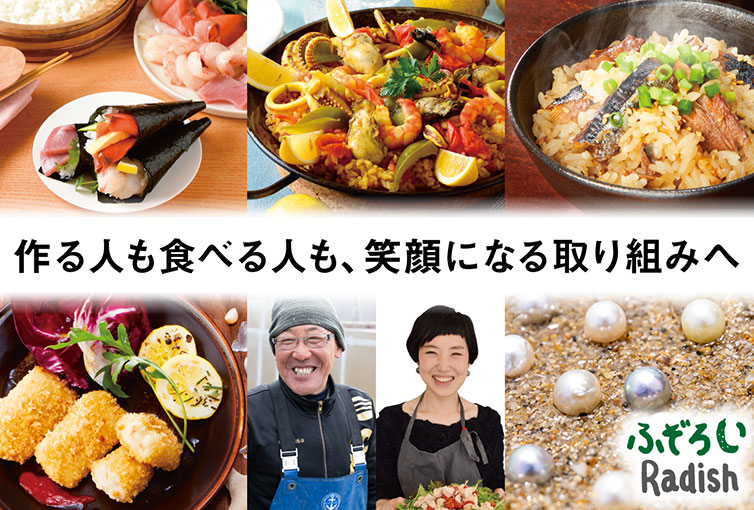
FUZOROI Radish
Fun, delicious and zero food loss
Oisix ra daichi Inc.
RadishBoya
Sales planning section and Promotion section, Sales division
Procurement division
(Reason for Selection)
Although the relevance between the use of unused fish and small-sized fish and the sustainability of fishery resources is unclear, systematic efforts from creating a concept centered on solutions to food waste, branding, information dissemination, to sales management was praised. Setting up a place for telling their efforts in an easy-to-understand manner and creating a new value of sustainability was also excellent.
In April 2021, Radishbo-ya, a door-to-door delivery brand established in 1988 with the aim of realizing a sustainable society, launched an initiative to reduce food waste and support producers. Under the slogan "Feast in the Contents rather than the Appearance," we develop a wide variety of products and services that go beyond the traditional concept of retail distribution to solve problems in the manufacturing, distribution, and consumption processes.
To reduce seafood waste, we work under the theme “Review the excessive selection of seafood products” and propose “clearing away the "standards" of seafood and sustainable fish-food- culture that people can enjoy the bounty and diversity of the ocean” as a new value.
Through this initiative, we aim to achieve both the effective use of limited fisheries resources and the support of producers.
Four months have passed since this project started, and we applied this award to further strengthen our commitment to social issues.
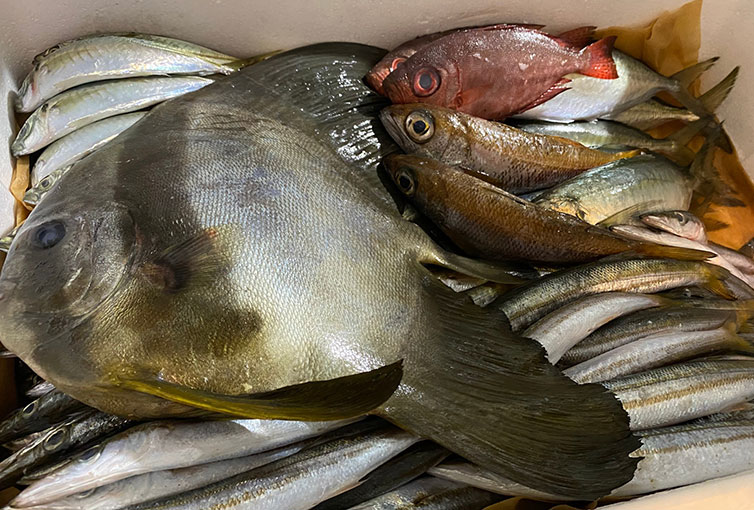
Designing the Future of Marine Resources of Japan
Innovation Design Co., Ltd.
Gate Inc.
(Reason for Selection)
Although it is unclear whether the use of unused fish or small fish will lead to the sustainability of fishery resources, it was appreciated that supply chain traceability is ensured.
Activities to raise awareness about fishery resources among the younger generation and pet owners also makes them a part of sustainable seafood movement.
KITCHEN MANE, a restaurant run by Innovation Design, offers fish caught by fixed-net fisheries with less environmental impact at Nigishima fishing port in Mie-Prefecture. Through below efforts, we are trying to make Japan's seafood industry sustainable:
1. Serve “unused” fish that are economically unvalued because of their too small size or other reason at the restaurant.As a part of Japanese culture, we continue to send out a message to revive the respect for nature "mottainai" to the present day.
2. Ensure transparency of traceability by delivering directly by fishermen.
3. Make a menu from the fish caught on that day. We don’t order specific fish species and contribute to reducing food waste.
4. Provide completely additive-free pet food that is only heat-treated on the landed fish to keep the pet’s health not only for human’s.
5. Give lectures and host showings of the movies to tell the social food issues, under our motto “
"Learning is the foundation for action".
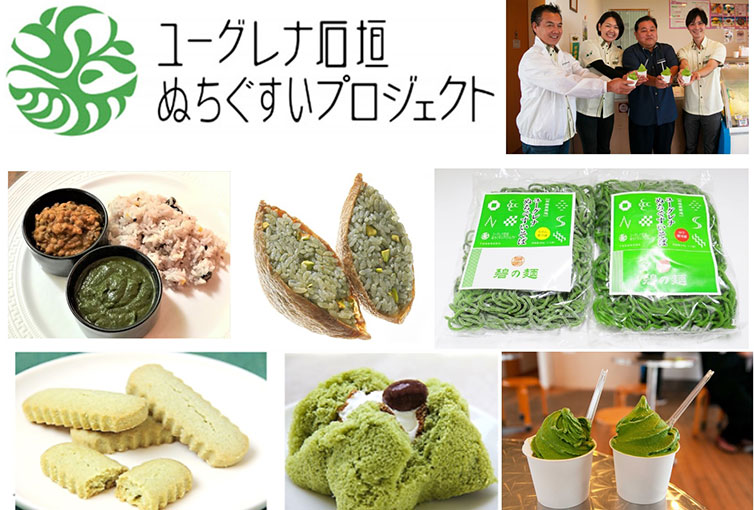
Sustainable Seafood Promotion Project in Okinawa by the World’s First ASC-MSC Seaweed Certification
Euglena Co., Ltd. Material & Overseas sales Department Ishigaki Region Team
Yaeyama Shokusan Co., Ltd.
euglena GARDEN
Agricultural corporation Imori Farm,LLC
Ryukyu Kokuto Co., Ltd.
Tokinari Foods
Ayumi Resort Co., Ltd.
NAHA bakery
(Reason for Selection)
Although it was unclear how the company appealed euglena as sustainable seafood, the fact that it has acquired ASC-MSC certification for the first time in the world for algae which is attracting worldwide attention has a significant impact on the industry. It was also appreciated that the company was expanding its market with local communities.
In January 2019, Euglena Co.,Ltd. became the first company in the world to obtain ASC-MSC seaweed certification for Euglena chlorella.
We are engaged in activities to popularize Euglena chlorella, a blessing of Ishigaki Island in Okinawa Prefecture, as "a new option for sustainable seafood for customers."
In March 2020, we launched “Euglena Ishigaki Nuchigusui Project” based on Ishigaki Island to promote development of the local community and develop new food menus and products with companies on the island to increase awareness of local specialities,
Although the development and sales of the local specialties were forced to stall due to
COVID-19 pandemic that broke out around the same time when the project started, we were seeking ways for community development. We kept on searching to develop new sales channel on the internet with suppliers and expanded our project to the whole Okinawa islands in June 2021 and are still working to further spread new sustainable seafood options.
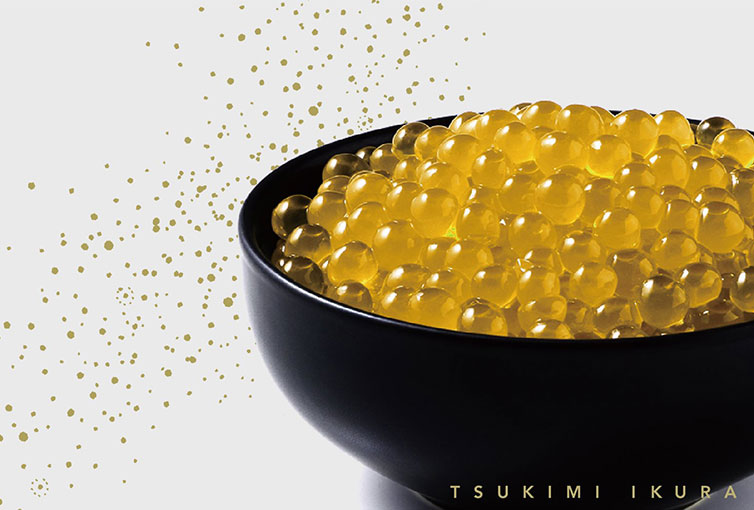
Tsukimi Ikura®: Make Salmon and Japanese Food Culture Sustainable by Cherry Salmon Circular Farming
Ken Ueno, CEO, Smolt
Prof. Katsuhisa Uchida, Faculty of Agriculture, University of Miyazaki
(Reason for Selection)
Although the sustainability of the production process remains unclear, while the catch of wild salmon has been languishing in Japan, the approach to producing salmon roe from farmed cherry salmon with a method that intended to reduce the environmental burden was appreciated.
We are a venture company established by University of Miyazaki in 2019. We utilize the circular cherry salmon farming system developed by Prof. Uchida. In October 2020, we collected roes of cherry salmons that had been farmed full-life cycle, and started selling them under the private brand "Tsukimi Ikura ®". In nature, salmon roes are produced by salmon that migrated in the ocean for four years, however, the resources of salmon have been severely dropped. That means, in addition to the conservation of salmonid fish, the sustainability of the food culture of salmon roe is at risk.
This project aims to continuously produce salmon roe from cherry salmon, a species of salmonid fish, in a short period of two years, thereby reducing the impacts on salmon resources and leading the sustainable seafood industry of "roes" as a food culture.
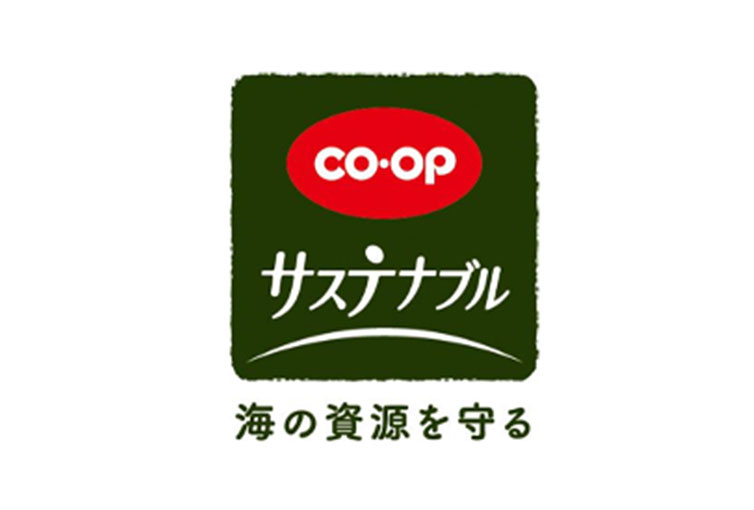
“CO・OP Sustainable” : Launch seafood under message"Protecting ocean resources" and efforts for “Responsible Procurement”
Japan Consumers’ Co-operative Union
(Reason for Selection)
With regard to"CO・OP Sustainable '' series, it was praised for announcing its targets for the ratio of products of the series to total product supply, and for the idea that the label is used for raising awareness of the sustainable label itself. For "2030 Goals for CO・OP Brand Products", and CO・OP Brand Products "Basic Policy on Responsible Procurement", it was highly regarded that it discloses specific numerical targets and time frames, and the status of progress.
Japan Consumers’ Co-operative Union launched "CO・OP Sustainable" product series in spring in 2021, using Co-op private brand products whose main ingredients are sustainable agricultural, forestry products and seafood. Certified Co-op seafood products have a message of “Protecting ocean resources” to make it easier for consumers to find and choose sustainables seafood at sales floor.
We also set "2030 Goals for CO・OP Brand Products", and CO・OP Brand Products "Basic Policy on Responsible Procurement" that aims to further consider human rights and environment and to promote “responsible procurement”, along with "Consumer Co-op 2030 Environmental Sustainability Policy" that every Co-op are working on.
Collaboration Award
An impactful multi-stakeholder collaborative project which took an innovative approach to drive the change in Japan.

The World’s First MSC- Certified Dried Bonito Project: Collaboration beyond Industries to Protect Japanese Food Culture
Kijima Co., Ltd.
YAMAKI CO.,Ltd.
Oceans and Fisheries Division, WWF Japan
(Reason for Selection)
Although the specific number of stores that have adopted the sustainable dried bonito, and how much the restaurants annually switch to are unclear, acquiring MSC certification at production sites and CoC certification at supply chain can be a model for the future development of certified products. In addition, the project shows the dried bonito industry that there is a hope for demand.
This is a collaborative project to make dried bonito that is the foundation of Japanese cuisine be sustainable, aiming to preserve an intangible cultural heritage, Japanese food culture.
WWF Japan built a bridge between a Japanese restaurant Kijima and a dried bonito and soup stock manufacturer Yamaki, both of which have independently been working on seafood sustainability and the partnership between the two companies was created.
Yamaki's MSC-certified dried bonito were introduced into Kijima's soup stock and provided to customers.
This is not only the first time in the world that MSC-certified dried bonito have been provided, but also the first case in which MSC-certified products are distributed in the form of soup stock. We believe this represents a major step forward in the expansion of sustainable MSC-certified products.
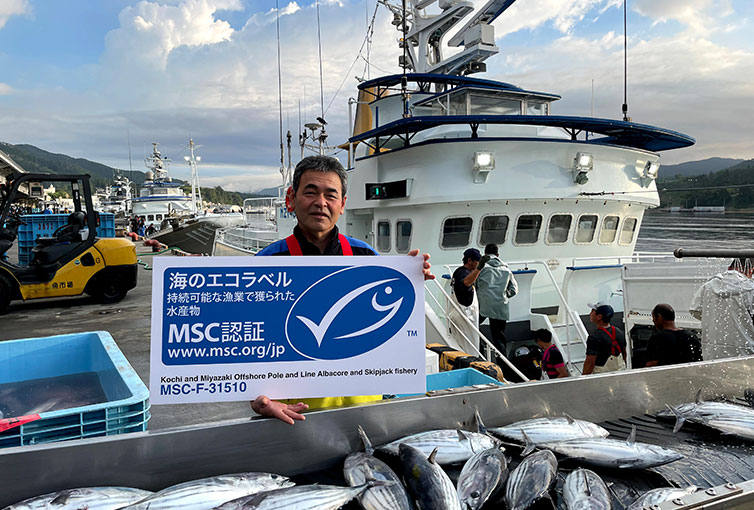
Acquire MSC Certification for Kochi and Miyazaki Offshore Pole and Line Albacore and Skipjack fishery
Japan Offshore pole and Line Tuna Fishery Sustainability Council
(Reason for Selection)
Cost is a challenge to acquire MSC certification in Japan where many of the coastal fisheries are family-owned business. However, it was innovative that the fishermen and fishery cooperatives in different regions cooperatively work and could show that the cost can be reduced if they work together. It was also praised that it is the first time for a fresh bonito fishery to acquire the certification, which has the good quality and is highly demanded in the market.
(name) that was found in November 2019 entered MSC’s full assessment on 9th July 2020, and in September, with cooperation of Fisheries Agency, National Research Institute of Far Seas Fisheries(at that time) and environment NGO, site visit was organized. After the client and peer review, public review and submission of a Notice of Objection, we successfully acquired the certification on 17th June, 2021.
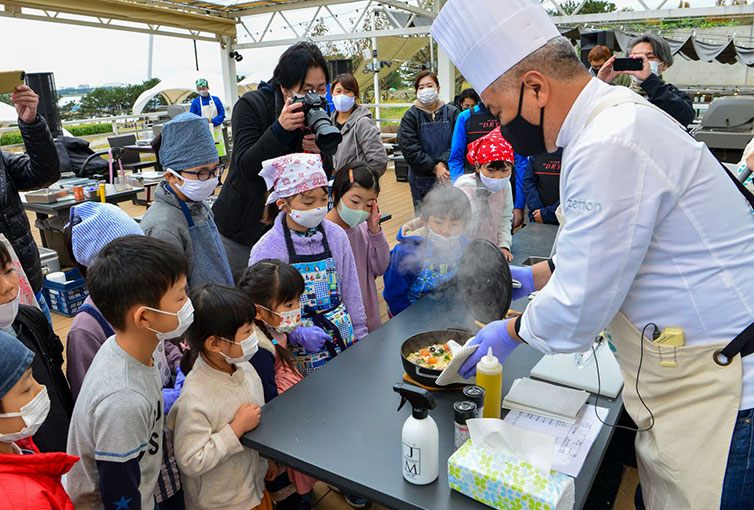
Chance for parents and children to learn about marine resources while cooking ASC-certified fish
Zetton Inc.
ASC Japan
WWF Japan
Nippon Foundation’s Ocean and Japan Project
Nippon Foundation’s Nippon Sabakeru Project
Although the effects and impact of this event were limited due to the pandemic, their educational activities for children is essential for sustainable seafood to take root in Japan. It was praised that the event was held by nationwide restaurants that have strong influence on both the seafood and restaurant/food service industry.
We hosted an event Chance for parents and children to learn about marine resources while cooking ASC-certified fish at SORAMIDO BBQ in Kasai Rinkai Park on 29th November, 2020 with ASC Japan and WWF Japan. The event was supported by Japan Foundation's Ocean and Japan Project and we cooperated with Japan Foundation's Sabakeru Project. The aim of this program is to help children and their families, who have never touched or treated raw fish, learn about sustainable seafood. By actually cooking and eating fish, children and their families can become familiar with the dangers of fisheries resources and the importance of sustainable seafood. It also helps to raise awareness of the MSC/ASC certification.
Special Award
Comprehensive cooperation agreement on sustainable use of seafood produced in Tokyo and conservation of marine environment
Tokyo Metropolitan Government, and Sailors for the Sea Japan
(Reason for Selection)
The efforts to establish a strong foundation for promoting the concept of sustainable seafood, taking an approach that suits Japanese society, and collaborating with prefectural governments were highly regarded. There are also high expectations for expanding this effort to other local governments. Since the Sailors for the Sea Japan is a member of the award committee, they refrained from applying, it was honored with a Special Award in recognition of its significant impact on the industry with Yuriko Koike, Governor of Tokyo.
Since its establishment in 2011, the Sailors for the Sea Japan (SFSJ) has published the Blue Seafood Guide to raise awareness of the sustainable consumption of fishery resources. With the motto 'Delicious, Fun, and Earth-Friendly,' the guide lists sustainable seafood commonly distributed in Japan. This time, the SFSJ and Tokyo Metropolitan Government which owns the largest seafood market in Japan concluded a comprehensive agreement and published the Blue Seafood Guide Tokyo. Joint promotion with the Tokyo Metropolitan Government and improving the seafood market in Tokyo are expected to have a significant impact on the seafood industry to promote the concept of sustainable seafood.